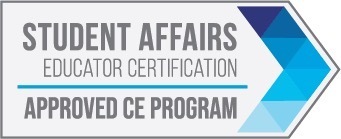
Creating Sustainable Careers in Student Affairs: Leading with Care & Intention
Recorded On: 01/23/2024
-
You must log in to register
- Non-member - $179
- Member - $79
Paz Maya Olivérez, Ph.D.
Vice President, Student Affairs
California State University, San Bernardino
An accomplished administrator and educator, Dr. Olivérez brings a wealth of higher education and California State University (CSU) experience to her role as Vice President for Student Affairs at California State University, San Bernardino (CSUB). Prior to serving as the associate vice president and dean of students, she served as the interim vice president for student affairs at Stanislaus State. Before that, she spent eight years at California State University, Dominguez Hills, where she held several administrative positions including associate vice president for student success.
Dr. Olivérez’s leadership experience in higher education includes oversight of programs that support student development, student engagement, and student success. During her 20 years as an educator, Dr. Olivérez has served diverse student populations throughout California and received national recognition for her innovative efforts to help students build a strong foundation for long-term educational and professional success.
Based on the book “Creating Sustainable Careers in Student Affairs: What Ideal Worker Norms Get Wrong & How to Make it Right” by Sallee, et al. (2020), this webinar will describe how leaders in one Division of Student Affairs worked with the book’s authors to intentionally develop and deliver a 2-year long series of in-person and virtual facilitated dialogues and workshops where staff were given the opportunity to engage with the book, its authors, and each other. These dialogues and workshops allowed participants to discuss the ways in which they internalized ideal worker norms throughout their professional lives, and how this shaped their behaviors as professionals, perceived expectations by their supervisors, consequent expectations of themselves, and the real-life costs of these behaviors and expectations. Honest and unfiltered conversations involving division staff and leaders about the impact of ideal workers norms on staff, their colleagues, and the students they serve revealed that these norms led to stress, burnout, fatigue, lack of work-life balance, disengagement, poor morale, and high turnover.
While they allowed for division leaders and staff to speak openly about how they had been feeling over the last two years and throughout much of their careers in Student Affairs, these dialogues were also cathartic as they provided a rare space for members of the division to engage in small and large group dialogue about how they were experiencing their work prior to, during, and in the aftermath of the COVID-19 pandemic. In fact, many participants expressed their appreciation to division leaders for being provided the space to discuss their experiences critically and for being given the opportunity to speak candidly about how they were feeling. However, others remained skeptical that these conversations would lead to actionable steps and tangible change that would impact their experience as workers in their respective division, on their respective campus, and/or in the field of student affairs or higher education.
Participants in this session will have the opportunity to hear from the SSAO who worked with Dr. Sallee and her colleagues to initiate and deliver the book read and related dialogues and workshops. Those in attendance will also have the opportunity to share approaches to supporting the long-term sustainability of student affairs professionals utilized on their own campuses prior to, during, and in the aftermath of the pandemic and the degree to which these efforts impacted the culture of their divisions and their work on behalf of students. The presenter will also facilitate an interactive discussion of the challenges experienced by professionals and students in the room on their own respective campuses and how they might apply the approaches described in the session.
Learning Outcomes:
1. Learn about the concept of ideal worker norms and how real & perceived manager expectations can exacerbate the fatigue, stress, and burnout often experienced by student affairs professionals responsible for supporting diverse students with complex and ever-changing needs;
2. Learn how leaders in one Division of Student Affairs worked intentionally to change their division culture by offering opportunities for staff to engage in critical dialogue to dismantle ideal worker norms;
3. Learn how honest dialogue involving Student Affairs leaders and staff at all levels can result in improved staff morale, greater trust and tangible change;
4. Learn practical strategies for implementing actionable steps and tangible changes that can be made in any Division of Student Affairs to dismantle ideal worker norms and create more sustainable careers for student affairs professionals.
Questions about the webinar? Email practices@naspa.org.
NASPA has been approved by the Higher Education Consortium for Student Affairs Certification to provide CE credit for Certified Student Affairs Educators (CSAEd). NASPA is solely responsible for all aspects of this program.
Guidelines for earning CE credit:
1 CE is awarded for attending this live session.
No partial credit will be rewarded.
Participants must also complete the feedback survey in the Online Learning Community.
Credit is available for attending the live session and viewing the on-demand recording.
To receive CSAEd credit, attendees must complete the Feedback Survey in the online event offering the certification. Once the survey is completed, your Certificate will be available in the event modules. The Certificate of Completion, which will show the event and credit earnings, is available for download and/or print from the event in your Online Learning Community.
